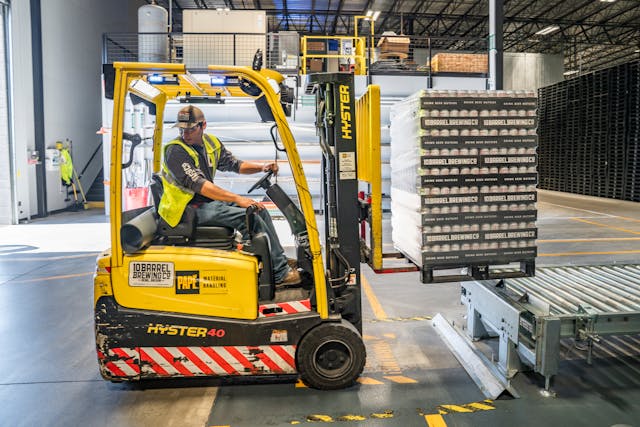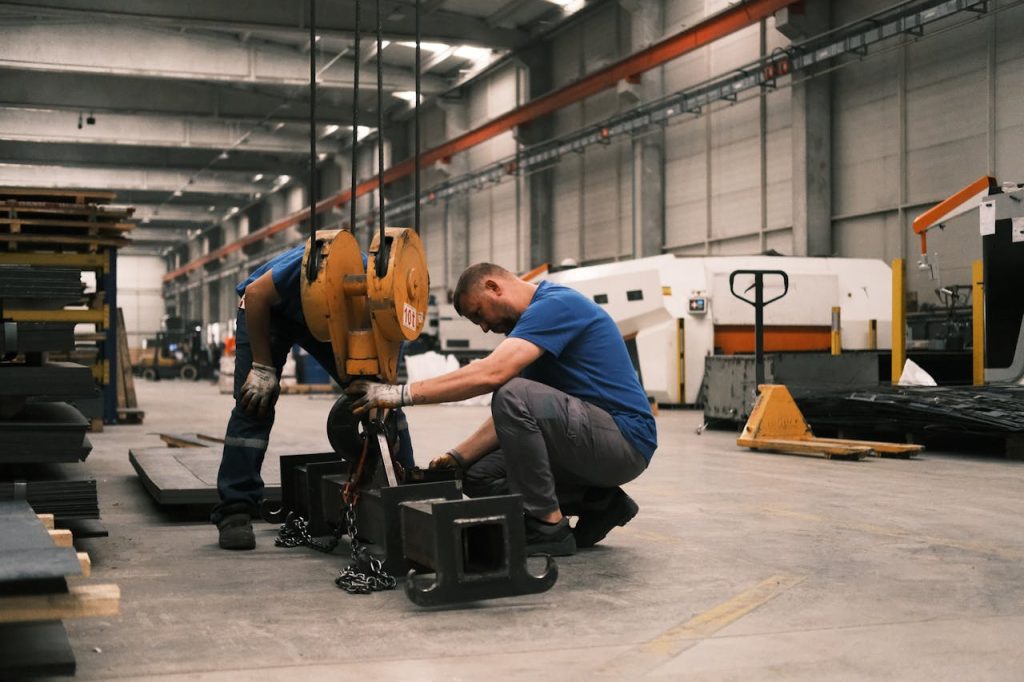Sustainability can be the one thing that bridges the gap between what companies need to fulfill their broad business goals, and that which can empower, engage and give purpose to blue-collar employees.
Table of Contents

The (often) overlooked potential of blue-collar employees
Blue-collar employees are the backbone of many companies and industries; from manufacturing and logistics to construction and maintenance, these workers are key to business success. However, their potential and very valuable expertise is often overlooked, even as companies rely on their hands-on experience to be competitive.
But it is precisely their proximity to operational processes and their practical understanding of materials, energy use, or waste management, among other things, that positions them as key players in identifying and implementing sustainable practices.
By recognizing their potential, companies are not only improving their sustainability outcomes, but also showing respect and appreciation for the vital contributions of the blue-collar workforce. Empowering these employees to contribute to sustainability efforts can lead to a more engaged workforce and a stronger alignment between broad organizational goals and day to day operations.
Do your employees know how to contribute to the ESG strategy?
Why blue-collar employees matter in sustainability
When it comes to driving sustainability initiatives, blue-collar employees often remain away from the conversation, as a matter of fact, it almost exclusively concerns the executive level and white-collars.
But these workers have unique and very valuable insights, this is, they have the necessary frontline perspective and knowledge that can uncover possible inefficiencies as well as potential areas for improvement.
In this section we want to explore some of the reasons why blue-collar employees can bridge the gap between high-level sustainability goals and ground-level action.
- Proximity to daily operations: Blue-collar employees are directly involved in the day-to-day operations of businesses, giving them firsthand knowledge of inefficiencies in processes, equipment, and resource usage. They are uniquely positioned to identify wasteful practices and propose practical, on-the-ground solutions that leadership might miss.
- Hands-on expertise: With years of practical experience, blue-collar workers have deep technical knowledge of how systems and processes function. This expertise often leads to innovative ideas for optimizing resource use, reducing waste, and improving energy efficiency, all critical to sustainability efforts.
- Workplace culture influence: Blue-collar employees play a vital role in shaping workplace culture. When they lead or adopt sustainable practices, their behaviors and attitudes can influence peers, creating a ripple effect that drives broader adoption of sustainability initiatives across the organization.

The challenges of engaging blue-collars in sustainability
Even if their role in sustainability is key, there are significant challenges that arise when trying to engage blue-collar employees in sustainability efforts. It is absolutely crucial for companies to address these systemic barriers before anything else.
Because while these workers are very well positioned to contribute meaningfully, they are often limited in their ability to drive change. Let’s take a look at why and how.
- A lack of awareness and training: Many blue-collar employees may not be fully aware of how their roles intersect with sustainability goals. Without proper training or education, they might not recognize how their day-to-day actions can contribute to reducing waste or conserving resources, for example. Similarly, they might not even know these are key sustainable goals for the company.
- Strong hierarchical barriers: Traditional workplace hierarchies can exclude blue-collar workers from decision-making processes. This top-down approach may prevent them from sharing valuable insights or feeling empowered to suggest changes.
- Limited recognition and incentives for change: Contributions from blue-collar employees often go unnoticed or unacknowledged. Without recognition or tangible incentives, there is little motivation for these workers to go above and beyond in driving sustainability efforts.
How a CSO drives sustainable change across all levels of the organization
How to empower blue-collar employees in sustainability
Empowering blue-collar employees to lead sustainability efforts requires more than just recognizing their potential, it demands companies to pursue and implement actionable strategies that break down barriers and create opportunities for meaningful engagement.
By providing the right tools, resources, and support, organizations can unlock the otherwise overlooked expertise of these workers, turning them into drivers of sustainable change and impact. In this following section we will outline several key strategies to engage, train, and empower blue-collar employees.
Provide sustainability education and training
Education and training are the foundation for empowering blue-collar employees to actively participate in sustainability initiatives, as most workers often lack awareness of how their roles connect to broader environmental goals.
Targeted training can help bridge the gap, that being through workshops, on-the-job training, or certifications, for example, all of these can equip employees with the knowledge and skills needed to identify opportunities for potential sustainable impact.
When employees understand how sustainability impacts their day-to-day operations, and how their actions directly contribute to broader goals, they are more likely to take ownership and drive meaningful change.
Equip employees with the the necessary tools and resources
While training is key, providing employees with the right tools and resources in the long term is essential for enabling such sustainable practices to endure and improve over time. Technological tools can significantly enhance their ability to align with broader sustainability goals and stay engaged with the company’s purpose.
Tools such as energy monitoring systems, mobile apps for tracking waste or emissions, and digital platforms for reporting inefficiencies allow employees to take a proactive role in sustainability efforts.
By integrating simple and accessible resources or technologies into their daily workflows, companies not only make sustainability more accessible but also reinforce the connection between individual contributions and organizational goals, fostering a sense of purpose and engagement.

Measure, recognize and reward contributions
Acknowledging the efforts of blue-collar employees in sustainability is crucial for maintaining motivation and engagement. By implementing systems to measure their contributions and publicly recognizing their achievements, companies can foster a culture of appreciation.
On the other hand, offering rewards, whether through incentives or other opportunities, further reinforces the value of their efforts and encourages ongoing participation in sustainability initiatives.
Find and leverage sustainability ambassadors
Chances are not every single employee will be instantly convinced, however, companies can identify the more passionate and engaged blue-collar employees as sustainability ambassadors and leverage their commitment to amplify efforts across the workforce.
These ambassadors can serve as role models to their peers, advocating for sustainable practices and encouraging others to adopt similar behaviors. By providing these individuals with additional training and leadership opportunities, companies can empower them to lead initiatives.
Why blue-collar employees' role in sustainability is more relevant than ever
All in all, blue-collar employees are indispensable to sustainability efforts, yet their potential is still overlooked. But taking care of and empowering them is more crucial than ever, as the number of these workers in Europe is rapidly decreasing.
Sustainability can be the one thing that bridges the gap between what companies need to fulfill their broad business goals, and that which can empower, engage and give purpose to blue-collar employees.
Because empowering blue-collar employees shouldn’t just be about sustainability and its numbers, it should be about creating a workplace where everyone can contribute to a better tomorrow, no matter their position or role in the company.
